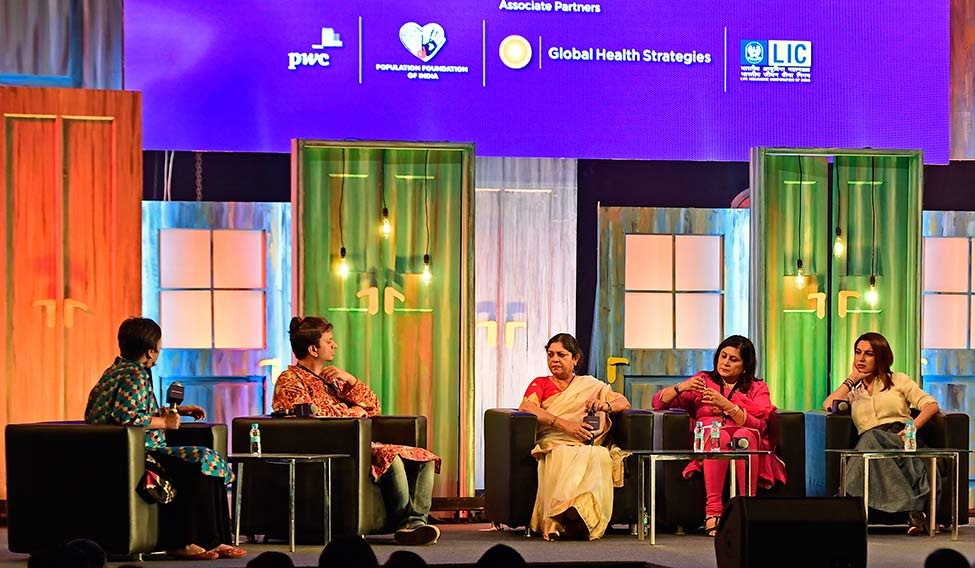For two days, 83-year-old Chandro Tomar, popularly known as ‘Shooter Dadi’ or ‘Revolver Dadi’, sat quietly on a couch in the makeshift lounge at Bandra’s Mehboob Studios. Everyone who came in looked at her with admiration. Young women achievers came to tell her how “inspiring” her journey has been, how she gives them hope to do better, to excel, and to “be determined”. From cricketer Mithali Raj to actor-writer Twinkle Khanna she had fans from different walks of life. Tomar doesn’t understand English very well, but she knows why people look up to her. She has won in the face of adversity. She was made fun of when she picked up a gun. “Budhiya bandook chalawe hai [The old woman carries a gun],” she says was the reaction in her family and village. But she had immense drive to do it and she just followed that.
Tomar has only one suggestion for women who want to excel—to continue doing what they are doing with dridhta (perseverance). “That’s what brings success,” she told me, narrating her story of becoming a sharpshooter at 65. She faced a lot of resistance from her family, but kept pursuing—initially in secret, and later, displaying her talent to the world on the range—winning many competitions in the veteran category to become the oldest woman sharpshooter in the world.
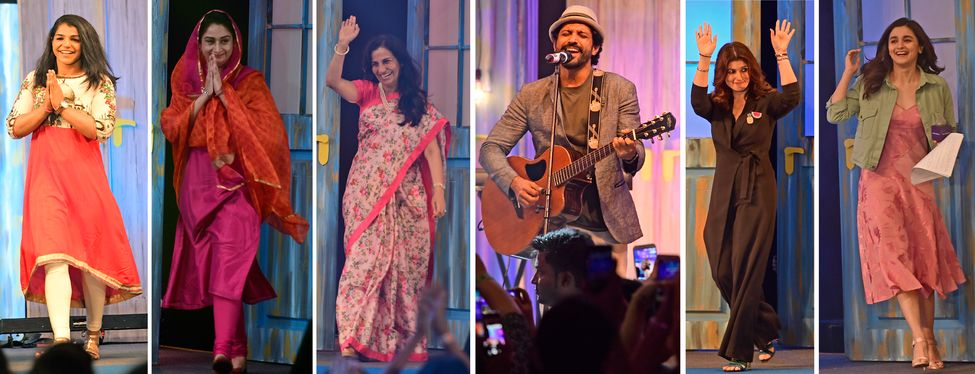 (From left) Sakshi Malik, Harsimrat Kaur Badal, Chanda Kochhar, Farhan Akhtar, Twinkle Khanna, Alia Bhatt at We The Women event.
(From left) Sakshi Malik, Harsimrat Kaur Badal, Chanda Kochhar, Farhan Akhtar, Twinkle Khanna, Alia Bhatt at We The Women event.
Some of the most endearing moments I came across while attending We The Women—an initiative by THE WEEK’s Contributing Editor Barkha Dutt—were of women celebrating women. The event held in Mumbai on December 9 and 10 brought together women achievers with diverse viewpoints to celebrate what they have achieved and to share the challenges they have faced. The scene defied the perception that women bicker and are always jealous of others’ success. Rather, it seemed that each woman participant knew that it took immense amount of daring to dream and even more persistence to fulfil those dreams.
Smriti Irani, Union minister of information and broadcasting and of textiles, in one session with film producers Ekta Kapoor and Karan Johar, recounted how her journey had not been easy—from mopping the floors of the first McDonald’s in Bandra, almost 20 years ago, to sitting at Mehboob Studios and talking at a summit for women. “There are women who choose not to have a career, but then get persecuted socially because it is presumed that since you are not ambitious, there has to be something wrong with you,” Irani said. “Irrespective of what kind of woman you are, there is always a question mark on your head. And it seems that men effortlessly glide by.”
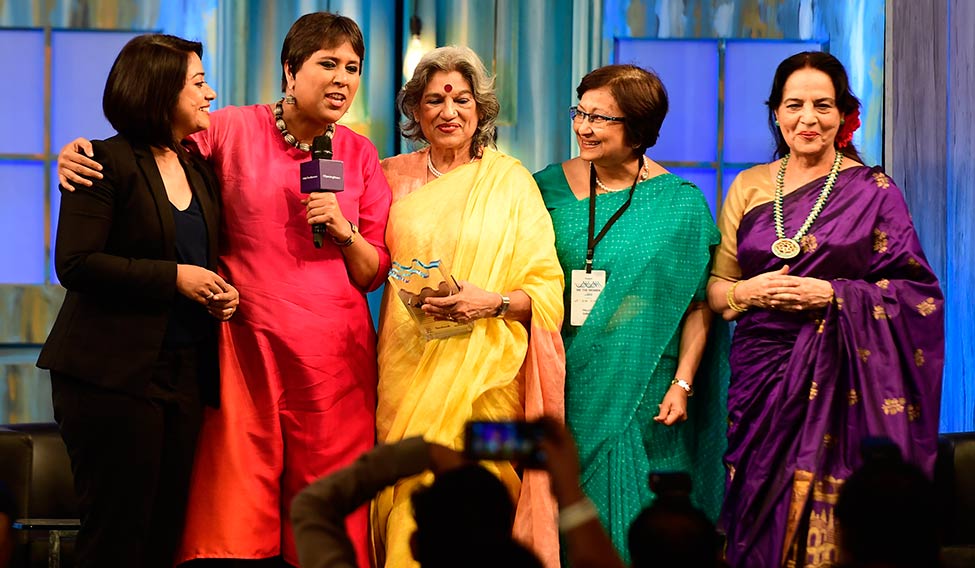 From left- Faye D’Souza, Barkha Dutt, Dolly Thakore, Pallavi Shroff and Salma Sultan at We The Women event.
From left- Faye D’Souza, Barkha Dutt, Dolly Thakore, Pallavi Shroff and Salma Sultan at We The Women event.
Most women participants had similar versions to recount. For instance, cricketer Mithali Raj shared how she was often compared to Virat Kohli or Sachin Tendulkar even though her journey was very different from theirs. As a cricketer, she has had to travel in unreserved compartments of trains—something a male cricketer may not have gone through. In the same session, actor Sonam Kapoor recounted how she once had to wait for a close-up shot for almost six hours because the male co-star was not ready. Iqra Rasool, a 19-year-old aspiring cricketer from Kashmir, later told Raj that she idolised her.
In a session moderated by Shivam Vij that brought together TV journalists from different eras, Salma Sultan, one of the first women newsreaders on Doordarshan, recalled that the men had hated her. She said she often got memos for not being disciplined enough. “I never understood what that meant. But, now I think it meant toeing their [men’s] line,” she said with laugh. Dutt, at that instance, recalled an interview where Hillary Clinton told her that “women need to have skin as thick as rhinoceros”. Dutt said, “To get to the same point as a guy, you have got to work twice as hard, if not thrice.” “And, you will be scrutinised on totally different terms—your personal morality, your relationship status. Nobody will care to find these things about a man.”
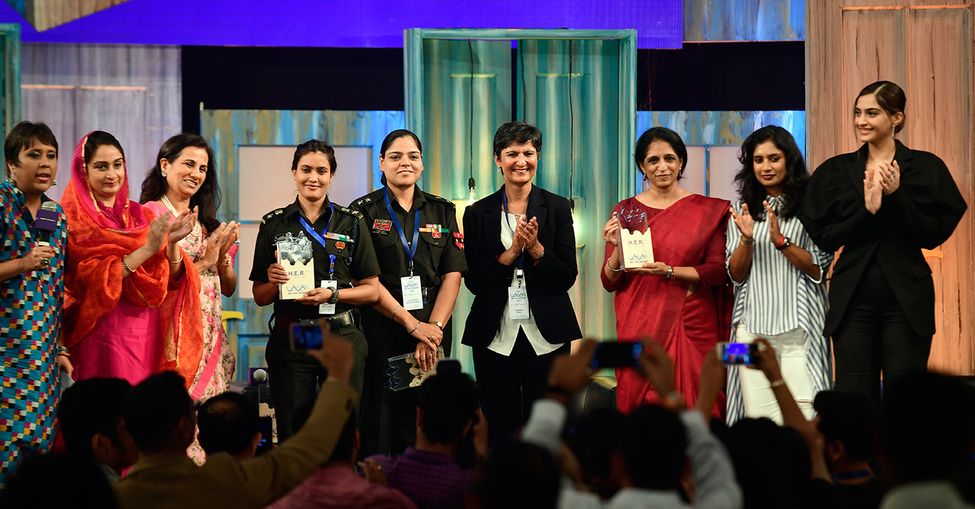 (From left) Barkha Dutt, Harsimrat Kaur Badal, Chanda Kochhar, Lt Col Sofiya Qureshi, Lt Col Navneet Duggal, Harinder Sidhu, Nitu Bhattacharya, Mithali Raj and Sonam Kapoor.
(From left) Barkha Dutt, Harsimrat Kaur Badal, Chanda Kochhar, Lt Col Sofiya Qureshi, Lt Col Navneet Duggal, Harinder Sidhu, Nitu Bhattacharya, Mithali Raj and Sonam Kapoor.
In one of the sessions titled ‘Missing Shakti at work: Why are fewer Indian women working’, corporate lawyer Pallavi S. Shroff, managing partner of law firm Shardul Amarchand Mangaldas, narrated how, in the initial stages of her career, people used to ignore her and consult her husband instead. She divided into three categories the reasons that made working difficult for women. “One is society or how it accepts women in certain professions; two, the organisational support; and three, a woman’s own desire to stick it out and make a mark,” said Shroff. “A lot of women lack self-confidence. But, it is not easy. For an average woman, it is not easy to have the courage to stick it out.”
In the session attended by Twinkle Khanna and Arunachalam Muruganantham, known as ‘pad man’ for making low-cost sanitary pads, stories of women’s reluctance to talk about menstruation were narrated. The two have collaborated on the subject for the film Padman, starring Akshay Kumar, Sonam Kapoor and Radhika Apte, to be released next month.
When Dutt opened the summit, she spoke of ‘Opening Doors’—the theme for the event. But, the two days were more than just exploring new opportunities; it was also about sharing the pain—as some Bohra women did when they discussed genital mutilation—and finding possible solutions to it. Even moments of fear that helped one become stronger were relived. For instance, Col Navneet Duggal gave a chilling account of collecting body parts of a jawan at an army camp, after which she did not sleep for many days. Nothing has scared her after that.
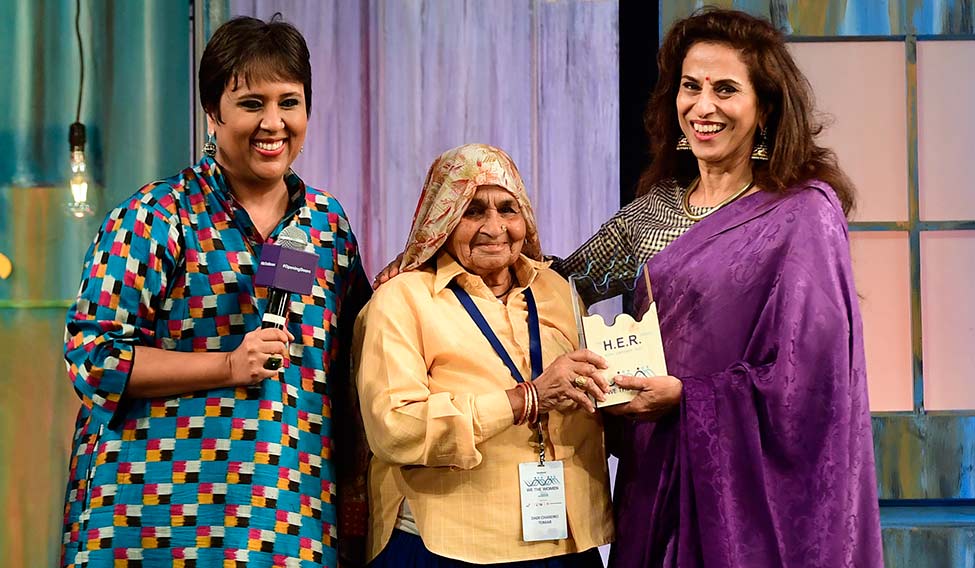 Shobhaa De felicitates Chandro Tomar.
Shobhaa De felicitates Chandro Tomar.
Geeta Tandon, a stunt women in the entertainment industry, after years of abuse in marriage, decided to break free. Life was never sweeter for her than it is now—she is happy to work and provide for her two kids. Varnika Kundu, who fought her stalkers in Chandigarh earlier this year, had her “first-ever panic attack” during the harrowing experience. “If I hadn’t complained [to the police], I would have been afraid of something like this happening again.” She reported them, not just to overcome her fear, but also to set an example.
As each of these women recounted their journeys towards success, their fights to claim their position and struggles to stand out in the male-dominated world, the loopholes in society and the system were exposed, and the patriarchal mindset was glaring. Writer-poet Tishani Doshi, while presenting her poems, summed it up when she spoke of witnessing starlings flying together in Rome. It was one of the most beautiful choreographies she had ever witnessed. “The reason why starlings fly together is not just for aesthetics, but it is the only way they can be safe from their predator, the peregrine falcon,” said Doshi. “I have always thought of that as a symbol for solidarity, for feminism, for what happens when we stick together. Sometimes we lose sight of the fact that we are very similar, but we can find allies in each other.” We surely can.
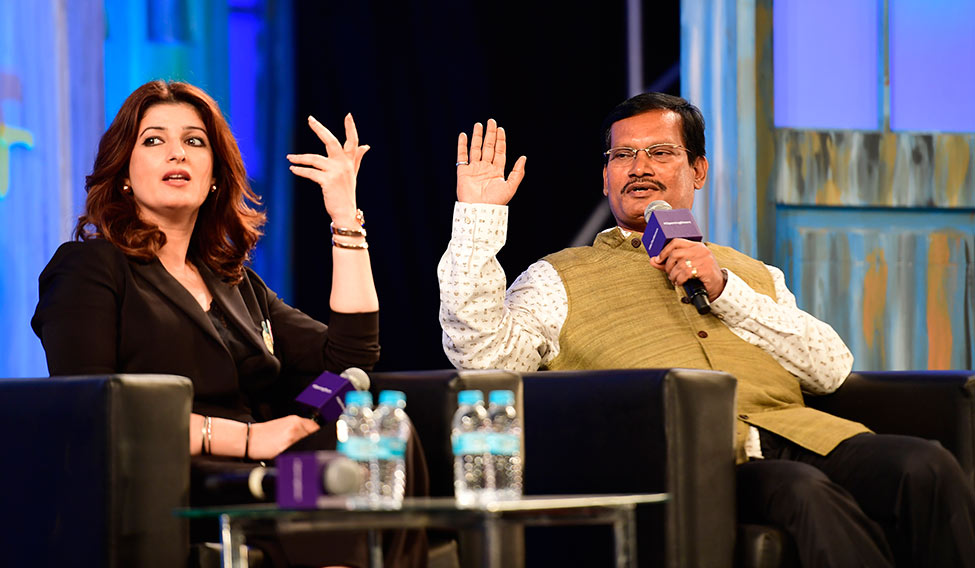 Twinkle Khanna with Arunachalam Muruganantham.
Twinkle Khanna with Arunachalam Muruganantham.
Ever since the Harvey Weinstein scandal broke out, sexual harassment at the workplace has been a hot topic. At a session titled ‘India’s Harvey Weinsteins’, actor Tisca Chopra said: “A lot of young girls don’t know they can speak up and confront the situation head-on. This is mainly because they are very young, anxious and nervous, and think they will be cut off from the industry. That is why, only after acquiring success, fame and a clear voice they start speaking out about it.”
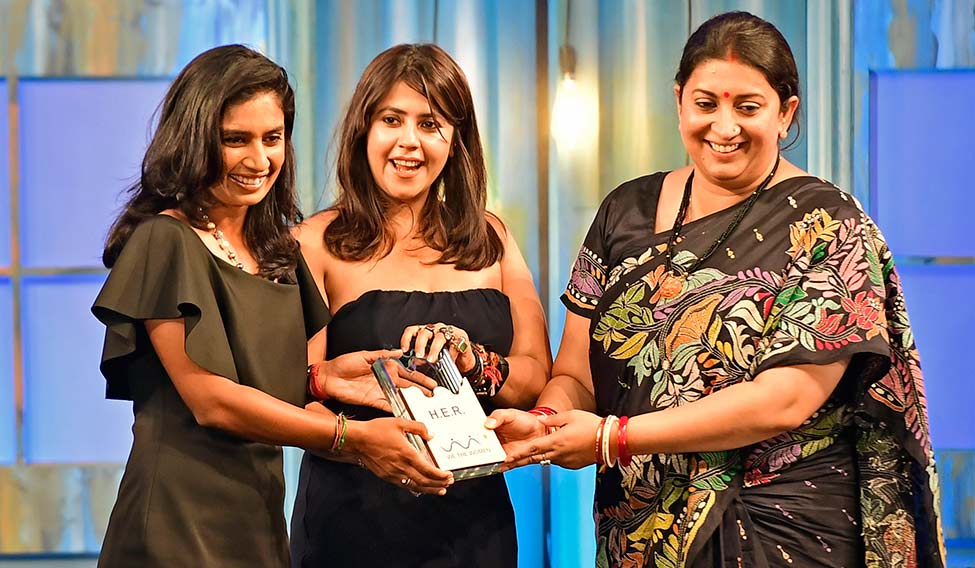 Mithali Raj felicitated by Ekta Kapoor and Smriti Irani.
Mithali Raj felicitated by Ekta Kapoor and Smriti Irani.
The session highlighted how most women are not even aware they are being sexually harassed at their workplace. Lawyer Mrunalini Deshmukh explained that the common forms of harassment women face at the workplace were being objectified. “It starts not only as words or gestures but also includes any kinds of suggestions that are sexually coloured and affect a woman’s sensibility. This also counts as sexual harassment,” said Deshmukh.
Close to 90 per cent of Indian women cannot afford to buy sanitary pads, which are treated as a ‘luxury item’ even after the arrival of Goods and Services Tax. Speaking up about this injustice, actor-writer Twinkle Khanna lashed out at callous politicians during a session called ‘Let’s talk about it. Period’. “If a male politician put a pad between his legs with blood dripping all day, I am sure pads would be freely available in public institutions,” she said.
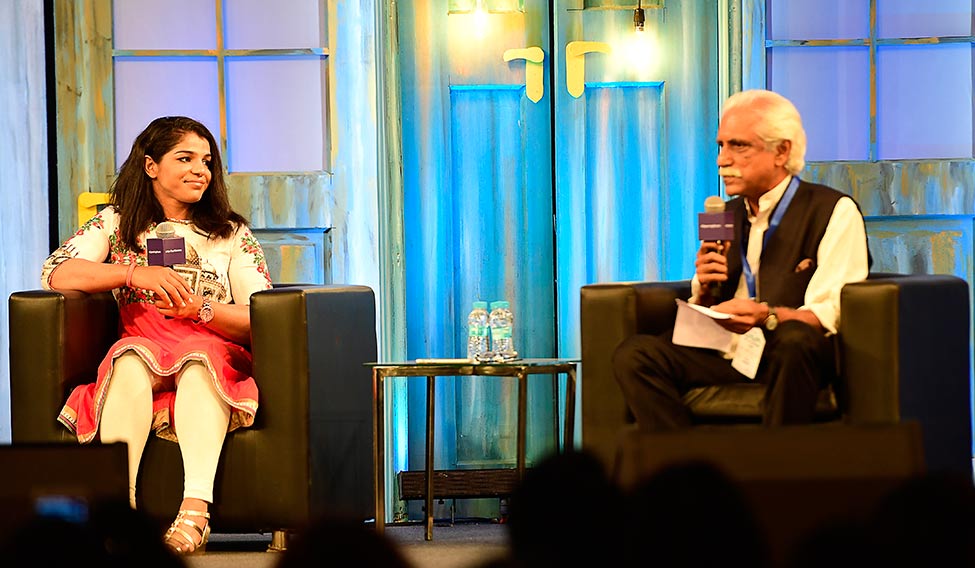 Sakshi Malik in conversation with Ayaz Memon.
Sakshi Malik in conversation with Ayaz Memon.
Famously known as the ‘pad man’, Arunachalam Muruganantham narrated his experience of trying to make a low-cost sanitary pad for women living in rural India. “The moment I experienced the feeling of wearing a sanitary napkin with goat blood dripping through a pipe, I first lost my confidence,” he said. “Second, I lost my independence. Every five minutes, I had to check my dhoti for blood stains and people suspected I had sexual diseases or that I was a vampire.”
Women can code. I would like to put a full stop after that statement and not a question mark because I believe women can code. As for women who do not code, it is by choice,” said Nivruti Rai, country head, Intel India. At a session titled ‘Girl code: A talk’, Rai spoke about being an engineer in a man’s world.
“If organisations had a gender, Intel is the most masculine company you can imagine,” she said. “Working with Intel for the last 24 years has toughened me, and I refuse to define myself by the paradigms that many people use to define a woman. The biggest problem we coders have is to give a robot sensitivity, and a study found women coders created robots that have better sensitivity than men,” said Rai.
“If more women enter the workforce, 28 trillion dollars will be created all over the world. A woman is still not getting paid as much as a man because of a lot of unconscious bias works against us women. By the time we create 3D printed hearts, women still won’t have equal wages,” she said.
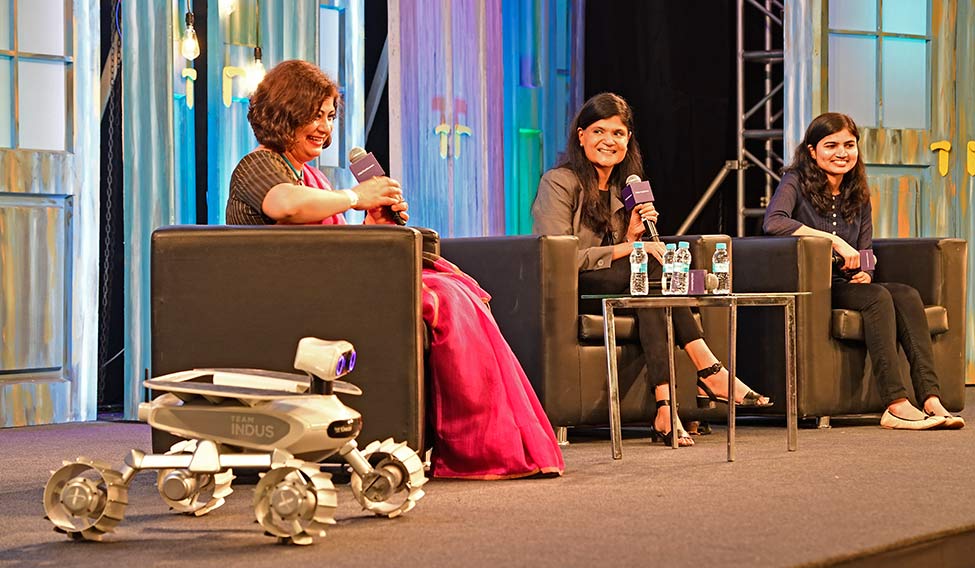 Supriya Bezbaruah with Team Indus’s Sheelika Ravishankar and Deepana Gandhi.
Supriya Bezbaruah with Team Indus’s Sheelika Ravishankar and Deepana Gandhi.
Olympic wrestling medallist Sakshi Malik said, whether she was in India or abroad, she was under constant scrutiny which deprived her of the freedom of maintaining a normal social life. In a session titled ‘Wrestling with Sexism’, while in conversation with sports journalist Ayaz Memon, Malik said: “What bothers me the most is, as a wrestler, I can’t go out and meet friends, especially at night. I have seen so many wrestlers from other countries do it while I was abroad, and they have that freedom. However, if I do the same thing, my entire career could be ruined.”
Famously known as the ‘Revolver Dadi’, Chandro Tomar spoke about how she fought against the patriarchy in Uttar Pradesh’s Johri village, and taught her granddaughter how to shoot. “I have never been afraid of guns and I firmly believe that every single woman should learn how to use a gun,” said the gritty 83-year-old. “I have made efforts to teach other young women as well how to shoot.”
Tomar’s granddaughter Shefali, who is now a national-level shooter, was 12 when her grandmother taught her how to load a gun; she was scared even to hold it. “When I saw my grandmother using the gun, I was very impressed and that gave me the confidence to take it up,” said Shefali. “My grandfather would shout at her and tell her to work on the farm like other women. However, she would still take me to the shooting range and make me practise along with her.”
COMPILED BY ANURADHA VARANASI



